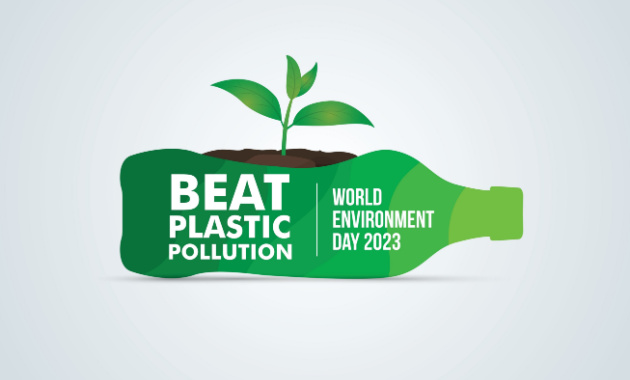
World Environment Day is a global platform that encourages awareness and action for the protection of our environment. Every year, on June 5th, individuals, communities, and organizations come together to address pressing environmental challenges. One such challenge that demands urgent attention is the issue of plastic pollution. With the theme “Beat Plastic Pollution,” this World Environment Day serves as a rallying cry for all of us to take immediate action to tackle this growing crisis[1].
In this article, we will explore the detrimental effects of plastic pollution and highlight practical solutions to combat this global threat.
The Menace of Plastic Pollution
Plastic pollution has reached alarming levels, posing significant threats to ecosystems, wildlife, and human health. The proliferation of single-use plastics, such as bottles, bags, and packaging materials, has led to massive environmental degradation. Plastics take hundreds of years to decompose, clogging our oceans, rivers, and landfills. It is estimated that eight million tons of plastic enter our oceans each year, endangering marine life and disrupting fragile ecosystems. Moreover, microplastics have permeated every corner of the Earth, including our food, air, and drinking water, potentially impacting human health[2].
Understanding the Impact
Plastic pollution has far-reaching consequences on both the environment and society. Wildlife, particularly marine creatures, mistake plastic debris for food, leading to entanglement, suffocation, and digestive system blockages. This results in the loss of biodiversity and disrupts entire ecosystems. Plastic pollution also affects tourism, as littered beaches and polluted waters deter visitors. Furthermore, the production of plastic contributes to greenhouse gas emissions and exacerbates climate change[2].
Call to Action
To beat plastic pollution, collective action is crucial. Governments, industries, and individuals must work together to address this global challenge. Here are some practical steps that can make a significant impact[2-4]:
1. Reuse:
-Carry a reusable water bottle: Instead of purchasing single-use plastic water bottles, carry a reusable bottle with you. This simple change can significantly reduce plastic waste.
-Bring your own shopping bags: Always carry reusable shopping bags or cloth bags when you go grocery shopping or running errands. Refusing plastic bags offered at stores helps reduce the demand for them.
-Say no to plastic straws: Request drinks without plastic straws or opt for reusable alternatives like metal or bamboo straws. If you prefer using a straw, carry your own.
-Choose reusable containers: Avoid using disposable plastic containers for food storage. Opt for glass, stainless steel, or BPA-free reusable containers to pack your meals or store leftovers.
-Avoid single-use plastic cutlery: Carry your own set of reusable cutlery (fork, spoon, and knife) to avoid using plastic utensils when eating on the go or ordering takeout.
-Shop second-hand: Purchase gently used items, such as toys, and furniture to reduce the demand for new plastic-packaged products.
2. Recycle:
-Know your local recycling guidelines: Familiarize yourself with what can be recycled in your area and ensure proper sorting of recyclable materials.
-Rinse and clean: Before recycling plastic items, rinse them to remove any food or residue. Cleanliness improves the quality of recycled materials.
-Support local recycling programs: Look for local recycling programs and initiatives that promote responsible waste management and support them for a cleaner environment.
3. Innovate:
Support eco-friendly alternatives: Look for innovative products and packaging made from biodegradable, compostable, or recyclable materials.
-Seek plastic-free options: Explore businesses and initiatives that offer plastic-free alternatives, such as bamboo toothbrushes or refillable cleaning products.
-Encourage sustainable packaging: Support companies that prioritize sustainable packaging practices and advocate for more eco-conscious solutions.
4. Educate:
-Spread awareness: Raise awareness about the dangers of plastic pollution through education campaigns. Teach the younger generation about the importance of responsible plastic use and disposal.
-Teach sustainable habits: Educate others on the benefits of reusable items, responsible recycling, and the proper disposal of plastic waste.
-Engage in community initiatives: Participate in local cleanup drives, educational workshops, or campaigns focused on reducing plastic waste.
5. Advocate:
-Support policy changes: Advocate for stricter regulations on plastic production, use, and disposal by engaging with local representatives, signing petitions, or joining environmental organizations.
-Promote sustainable initiatives: Encourage businesses, schools, and organizations to adopt plastic-free policies, implement recycling programs, or offer incentives for reusable alternatives.
-Participate in cleanup efforts: Join or organize community cleanups to raise awareness about plastic pollution and demonstrate the need for action.
Conclusion
On this World Environment Day, let us pledge to beat plastic pollution and create a cleaner, healthier planet for future generations. By adopting sustainable practices, supporting innovative solutions, and raising awareness, we can significantly reduce plastic pollution and mitigate its detrimental effects. Each individual’s actions matter, and together we can make a difference. Let us join forces to beat plastic pollution and safeguard the environment for a sustainable future.
(The article is written by Monalisa Deka, Senior Health Content Editor, and reviewed by Dr. Swati Mishra, Medical Editor)
References
1. World Environment Day 2023. UN. Available online: https://www.un.org/en/observances/environment-day
2. Thompson RC, Moore CJ, Saal FS, et al. Plastics, the environment and human health: Current consensus and future trends.Philos Trans R Soc Lond B Biol Sci. 2009; 364(1526): 2153–2166. Available online: https://www.ncbi.nlm.nih.gov/pmc/articles/PMC2873021/
3. Iroegbu AOC, Ray SS, Mbarane V, et al. Plastic Pollution: A Perspective on Matters Arising: Challenges and Opportunities.ACS Omega. 2021; 6(30):19343–19355. Available online: https://www.ncbi.nlm.nih.gov/pmc/articles/PMC8340096/
4. Kibria G, Masuk NI, Safayet R, et al.Plastic Waste: Challenges and Opportunities to Mitigate Pollution and Effective Management. Int J Environ Res. 2023; 17(1): 20. Available online: https://www.ncbi.nlm.nih.gov/pmc/articles/PMC9857911/